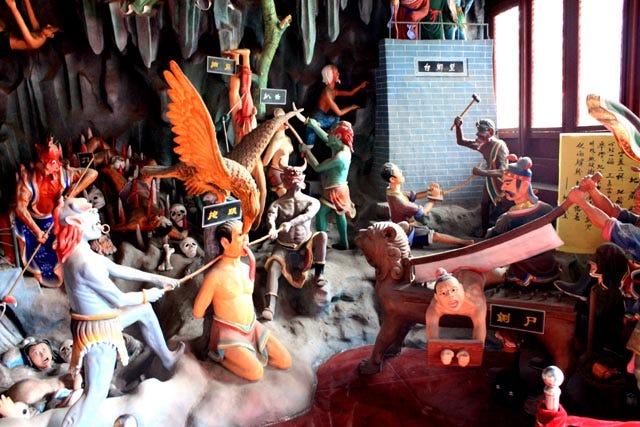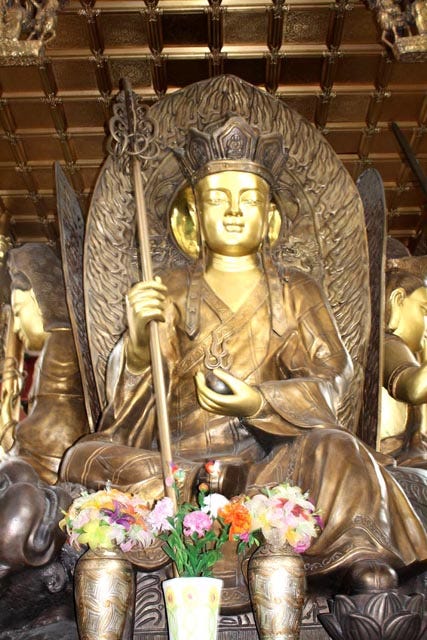Introduction: Meet Kshitigarbha
Guanyin (Avalokiteshvara), the Bodhisattva of Compassion, is certainly the most popular Bodhisattva in East Asia.
But running a fairly close second is the Bodhisattva known in Sanskrit as Kshitigarbha, called in China Dizang and in Japan Jizo.
He is known for having vowed to save all beings from the six hells, one for each level of existence: devas (gods), ashuras (demi-gods or titans), humans, animals, pretas (hungry ghosts), and narakas (hell-beings).
Chinese temples will often have a Dizang Hall where family members can (for a price) place memorial tablets with the posthumous names of their dearly departed. (Others have a "Hell Hall," highlighting the torments awaiting the wicked.)
In Japan, this devotion takes a darker turn: Jizo is especially addressed on behalf of the souls of stillborn, miscarried, or aborted fetuses, called mizuko, "water babies." I have been at Japanese temples where entire hillsides are covered with statues of Jizo, often wearing bibs and carrying toys or packets of treats placed their by grieving families.
Unlike the others of the Four Great Bodhisattvas (which, in addition to Avalokiteshvara, include Samantabhadra or Puxian, and Manjushri or Wenshu), who appear elegantly garbed, Kshitigarbha is usually shown as a monk, often with no headgear. But because of his mission, the Chinese sometimes conflate him with Yama (Chinese Yanmo), the King of Hell, so Kshitigarbha might be seen wearing a crown, and may then be called Dizang Wang, wang meaning "king."
He is usually seen carrying a monk's staff with six rings at the top, called a khakkhara. In the old days the monks would bang this staff as they walked, and the thump! of the staff and the jangle of the rings would frighten animals out of their path (so they wouldn't step on them). Kshitigarbha is said to use his staff to bust open the gates of hell.
This savior Bodhisattva sometimes holds a jewel in his hand, which he uses to dispel the darkness of hell.
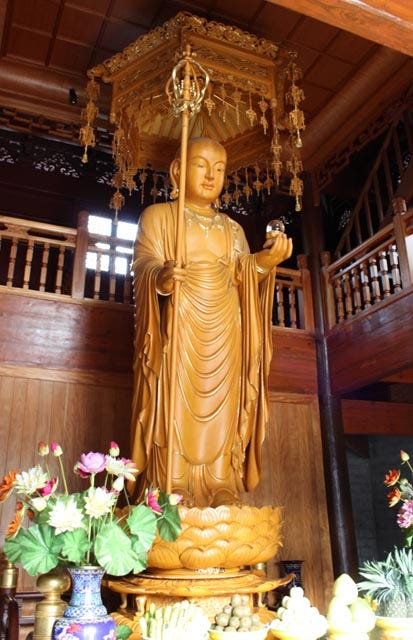
His name in all three languages mentioned translates directly as "Earth Store," "Earth Treasury," "Earth Matrix," or "Earth Womb." Since garbha is a reference to birth, the name alludes to his somehow bringing forth out of the earth, perhaps in the sense of raising beings up out of hell.
Like all Bodhisattvas, he has pledged not to become a Buddha until fulfilling his mission. Imagine being on the verge of Buddhahood and holding back until completing the Herculean task of saving souls until all the hells are emptied! (How long, O Lord?)
The literature give us a picture of Dizang's motivations for this formidable endeavor. Several times, in previous incarnations, he was deeply concerned about the fate of his own mother after her death, and then broadened his efforts.
The following three stories are drawn from those tales.
(I have supplied names for several nameless characters in the stories.)
The Stories: The Vow of Kshitigarbha
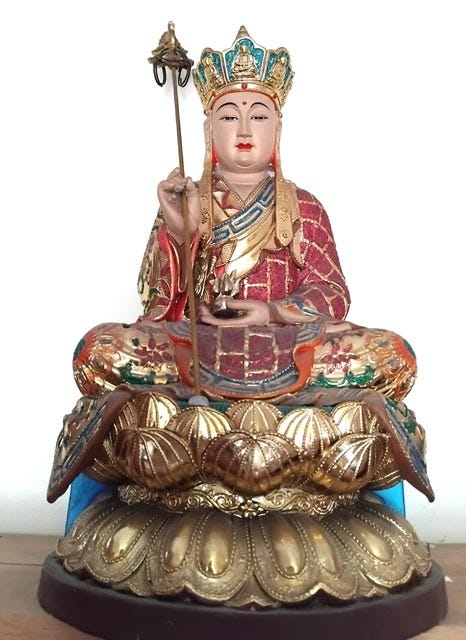
This happened in the time of the "Clear-Eyed Lotus Blossom Tathagata," ages upon ages before our era.
"Hello, Guangmu," said the Arhat as he entered the hall. "What brings you to the temple today?"
"Another offering, reverend sir," replied the woman, whose name is translated "Bright Eyes."
"That's fine, that's fine," the monk answered. "But tell me, why are you so diligent with all these offerings? I have seen you here so many times! I'm grateful for your support, but I have to wonder: what lies behind such devotion?"
Of course, with his advanced powers, he knew all along why she was here. But he also knew that it was time to broach the subject.
"It's my mother," the devotee replied, with a trembling chin. "Ever since her death, I have worried about her fate."
"Her fate?" the monk chided. "It is the result of whatever actions she took during her life."
"Oh, Venerable!" cried Guangmu, tears coming at last. "That is exactly the problem! My mother loved to eat things like fish and, especially, young tortoises. I fear she has gone to a place of suffering for her actions."
After a moment the monk asked gently, "Is there anything I can do?"
"Well, sir, if it's not too much trouble . . . We all know of your powers. Could you use them to determine my mother's condition?"
"I'll certainly try!" he said, trying to sound cheerful. "Please come back tomorrow, and I will tell you what I am able to discover."
That night the monk went into deep meditation, where he saw Guangmu's mother enduring the worst types of torment.
The next day the young woman returned and, without preamble, asked, "What did you find? I have to know!"
"I'm afraid it's . . . not good," the Arhat replied.
"Oh, isn't there anything I can do?" Guangmu begged.
"In fact, there is," he said, and instructed her in some practices that would alleviate her mother's suffering.
Time passed. One night, after weeks of rigorous practice, Guangmu had a dream. The Buddha of her age came to her and said, "Guangmu! Because of your devotion and filial piety, your mother has been released from the bonds of hell. She is soon to be born again, in this very household!"
When she awoke, Guangmu's eyes were bright indeed.
Some months later, one of Guangmu's maids rushed into her chamber, breathless. "Come quickly, Mistress!"
"What's the fuss, Mei?" she asked as they hurried together down the passageway, the young maid pulling on her arm to urge her to move faster.
"It's Lirong!"
"Did something happen to her baby?" Guangmu asked, a look of concern crossing her face. She knew Lirong had given birth three days before.
"No, my lady, it's just that . . . Oh, do hurry!"
At last they reached the maids' quarters where all the young women were gabbling excitedly. Seeing the lady of the house arrive, they parted to make a space, where Guangmu saw--
The baby girl was talking to its mother!
Seeing Guangmu enter, she turned her head toward her and spoke: "Guangmu! I am overjoyed to see you again! I was once your mother, and I have come to thank you for your efforts in freeing me from hell."
"Oh, Mother!" the woman cried out. "How could I do otherwise? I am so glad you have joined us. I can't wait to see you grow into a woman."
"Alas, my daughter, that is not to be. You see, my karmic debt still lies heavily on me. For this reason, I will not live more than 13 years, after which I will return to hell to work off the rest of my karma."
All fell into a hush at this news.
"But worry not," the newborn continued. "I have already made great strides, and trust that through your further efforts, my punishment will once again be mitigated."
And it was true: in her next life she was reborn, not as the sickly child of a housemaid, but as a Brahmin who lived to be a hundred years old.
And as this came to pass, Guangmu determined then and there that, someday, she would save not only her own mother, but all beings out of the six hells.
Guangmu, of course, many lifetimes later, became the Bodhisattva named Kshitigarbha.
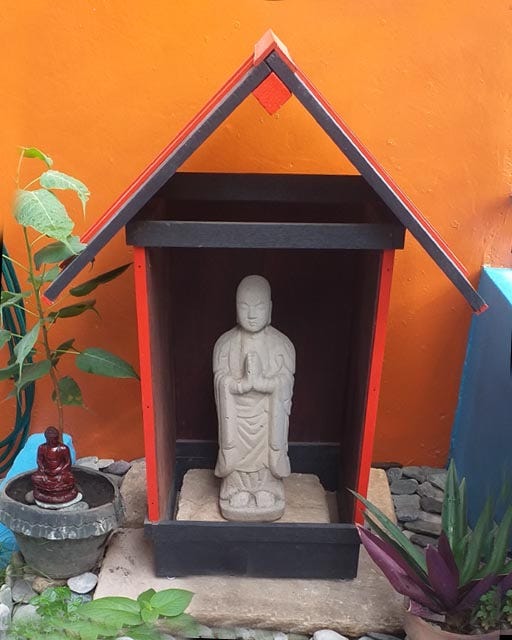
Our second story happened in another of Kshitigarbha's lives, before his final achievement, in the age of a Tathagata titled Sovereign Lord of the Flower of Enlightenment
Like Guangmu, another woman--let us call her "Suddha"--also had a problem, and--like Guangmu--that problem was her mother.
Suddha (called simply The Brahman Woman, or The Sacred Girl, in my sources) lived a devout and holy life. Whether this was because of or in spite of her mother is hard to say.
For the girl's mother was, frankly, a terrible person, who seemed to delight in speaking ill of the Triple Gem: the Buddha (of that age), the Dharma (always the same), and the Sangha. She also quarreled incessantly with others, and made life miserable for everyone around her.
At last the day came when the mother passed away, cursing and spitting at the Triple Gem until the very end.
What other fate could the old woman have, Suddha wondered, but to suffer the worst torments hell had to offer?
So Suddha gathered together all of her goods, including her fine clothing (except the barest minimum necessary for modesty), even her house, and sold them. She took the money and dedicated it all to offerings to the Buddha to enlist his help for her mother.
As she gazed on the image of that Buddha, the Sovereign Lord of the Flower of Enlightenment, she stood weeping until at last a voice spoke as though from above: "Grieve no more, holy woman! Attend unto me and learn your mother's fate!"
Palms joined, Suddha called out, "Who are you that can make such a promise? For my grief for my mother has known no bounds, and I have been unable to learn where she now abides."
The voice answered: "I am the one whom you are venerating, the Sovereign Lord of the Flower of Enlightenment. I have seen the vastness of your grief, and so have come to bring you word."
Utterly prostrated, Suddha begged, "Be merciful to me! Tell me where my mother has gone before I die, too!"
"When you finish making your offerings," the Buddha replied, "return to your home. Sit and meditate upon my name, and your mother's fate will be revealed to you."
Doing as she was told, and sitting for a day and a night, Suddha attained a vision of a raging ocean, with hundreds of thousands of people, male and female, rising out of the waves and sinking back in again. There were also thousands of frightening apparitions, demons and flying creatures. But because she trusted in the Buddha, Suddha was not afraid.
At last she was approached reverently by a demon king named "The Merciful," who addressed her kindly, "Good woman, why have you come?"
Suddha answered with a question, "What place is this?"
He replied, "This is the first ocean to the west of the Great Iron Enclosure Mountain."
"I have heard of this place," replied Suddha. "Is it not the ocean that contains a dungeon?"
"It is indeed one of them," said the demon king. "But you can only reach these places with divine aid, and with good karma."
Suddha then asked, "Who are all these people I see in the ocean?"
"They are sinners without a single good deed to their names. They have recently passed, and have no family to perform for them the propitiatory rites that might redeem them. They are fated to cross this and two more Seas of Retribution."
"My mother has recently passed," she said. "I wonder how her soul is faring?"
"Was she a good woman?" asked The Merciful.
"Oh, no!" the woman replied. "She was an evil person who constantly blasphemed the Triple Gem."
"And what is her name?" the demon king inquired.
"In life she was called Yuedili."
Joining his palms, The Merciful said, "Ah, her! You may rest at ease. Through your efforts, your mother has already ascended to heaven these three days past! And infinite numbers of others also followed her, as a result of the great piety of your actions."
He then withdrew.
Returning from her dream, Suddha reflected upon all she had seen. Knowing that, despite the results of her offerings, there were still many souls in the Seas of Retribution, she resolved to continue her efforts through many lifetimes until all were released, not only from the hell of the human realm, but from the other five as well.
This was yet another age in which the one who became Bodhisattva Kshitigarbha repeated this vow.
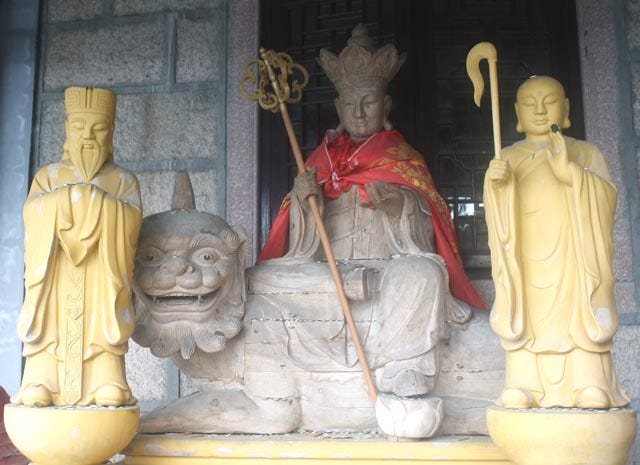
The third story is very short, but as a man whose daily life revolves around seven big dogs, it's the one I love the most! It seems to derive from a folk tale rather than a sutra; I have been unable to determine its exact origin.
In yet another age of yet another Buddha, the person who would become Kshitigarbha Bodhisattva lost yet another mother. Through advanced powers he--a man this time--was able to descend into hell, where he learned that his mother had already been reborn--as a dog!
Returning to this world, he sought and found that dog, and adopted it as his own. (For this reason the Bodhisattva is said to sometimes be portrayed with a dog as his companion, though I have never seen it.)
In further developments, it is said that when at last Kshitigarbha became a Bodhisattva, this simple white dog was transformed into a diting, a mythical beast with the head of a tiger, the body of a dragon, the tail of a lion, a single horn, ears like a dog, and feet like a qilin (a sort of Chinese unicorn on which Avalokiteshvara/Guanyin sits).
The diting can resist evil, look deeply into human hearts, understand the Dharma (the Buddha's teachings), and bring good fortune. (Just like my dogs!)
In some temples I have seen Kshitigarbha seated on this creature, though I have never seen one single statue that exhibits all the features described.
Conclusion: What to make of these stories?
I have to confess: I don't put much stock in supernatural beings, or rebirth, or heaven or hell.
Then, why do I love these stories so?
All stories teach, whether by design or in spite of themselves. I love what these stories teach.
First, they repeat again and again the importance of filial piety, a virtue nearly lost in my culture. We all "love our moms and dads," but seldom with the fervor and sacrifice seen in Asian and other, more traditional, cultures.
Beyond the parental connection, though, is the concept of compassion for all beings.
When I was in school, social studies were taught in what was called an "expanding environments" sequence. At the lower grades, kids learned about themselves and their families, then worked their way up to the neighborhood (the friendly fireman, policeman, mail man--all men when I was a kid), and then the city, state, nation, and finally the world.
We see a bit of that in these stories about Kshitigarbha's previous existences. She/he starts with intense concern for her/his mother, and ends by embracing all beings, from the meanest to the most exalted.
So stories of this sort remind us of the highest universal values. For me, the more far-fetched elements are nothing more than good storytelling, not tenets of belief.
If you feel differently, I'd love to hear from you--and why!
There is a way of seeing, by the way, in which the "six realms" represent six (human) personality types. I wrote about that it Episode 40.
--------
Well, that's that! Until next time, may you and your loved ones and all sentient beings be well and happy.
Adios, Amigos!
GET MORE:
Find this and all past issues of the Newsletter online at Substack.
If you have any problems reading the Newsletter , please write to me at TheTempleGuy@GMail.com, and I'll help you in any way I can!
In the next episode: The Mad Monk of Hangzhou





